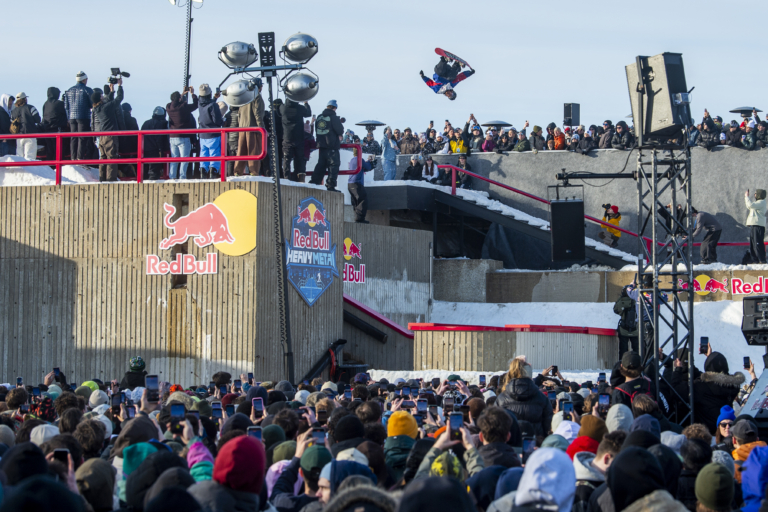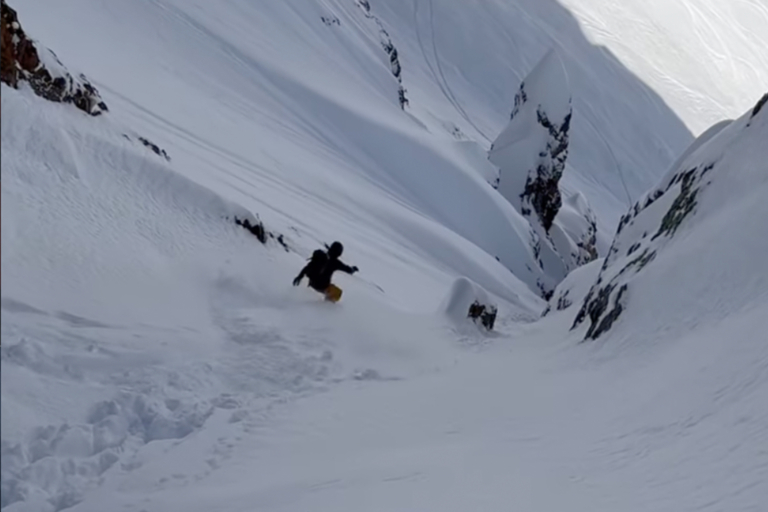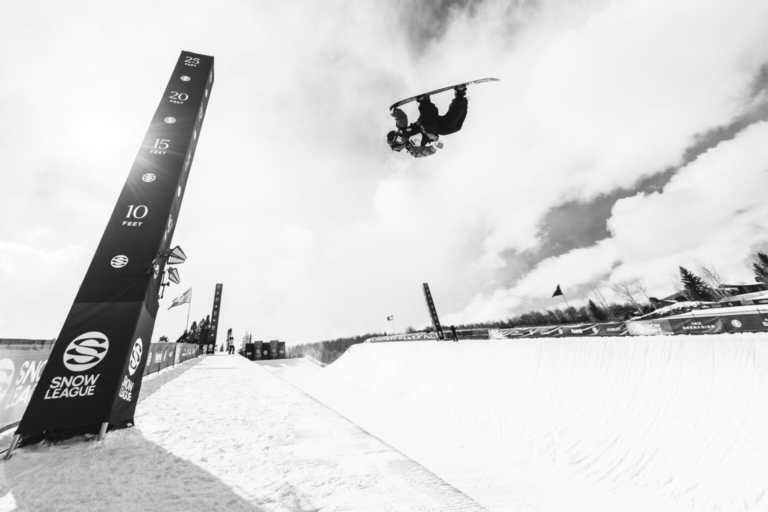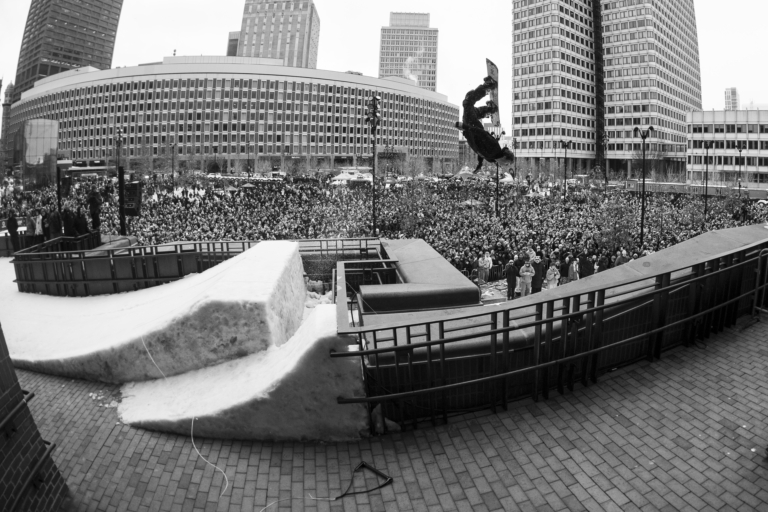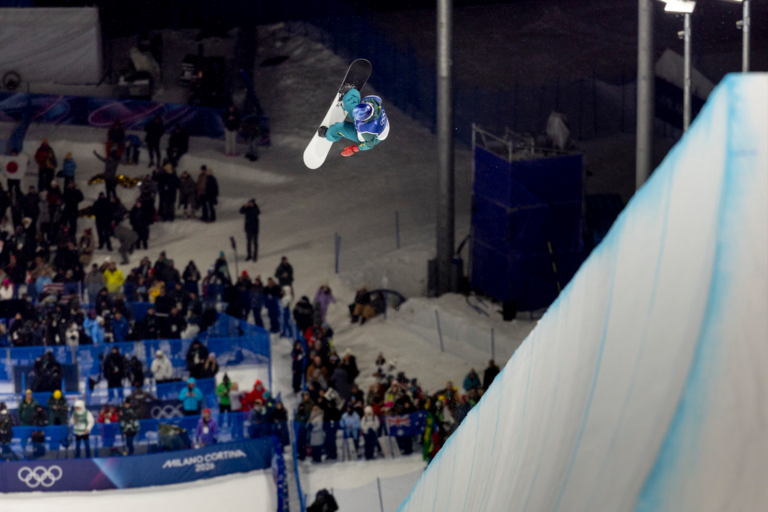Melissa Riitano: You have always been one to really go for it and throw yourself into a trick, regardless if you knew you would land or get destroyed trying. I absolutely admire that passion and attitude. Do you think you have sustained any concussions through this process or just snowboarding, in general?
Jess Kimura: I have had a lot of concussions. Honestly, I never kept count, but it’s definitely well into the double digits. I’m not proud of that, and to be honest, it really freaks me out. I’m at the point where it doesn’t take much for those post-concussive symptoms to come back and really mess with me. Most times I don’t actually hit my head on anything, it’s just from the impact or whiplash–like landing in a bomb hole, tomahawking in the pow, catching my edge, that kind of stuff.
I noticed that you started wearing a helmet more and more throughout your career, what prompted that shift?
I think it was just knowing that things were adding up. There was lots of coverage and new information about CTE in the news and media. Plus, seeing some other riders or athletes get serious TBIs. I was also struggling more and more with my mental health as a result of the concussions–or at least I noticed that it would get way worse after hitting my head. And I think a lot of people around me were concerned. I’m lucky enough to mostly work with filmers and photogs who care about me enough to encourage me to wear a helmet.
Were you ever nervous of how people or sponsors would react to wearing a helmet?
Only at first. When I was coming up, I would often hear industry folks or other riders say that magazines didn’t want to publish photos if the rider was wearing a helmet. That it somehow ruined the shot. I remember the season of ’11-12, I was on a filming trip with Des [Melancon] and we were like, Fuck it. Let’s run the helmets full time. I think we were both so affected by hitting our heads so much. We were kind of like, if the top two women’s street riders are wearing one, then what stops the other girls from wearing one? Let’s just force this to be accepted. The photos from that trip still ended up getting published. These days, I would say my sponsors would definitely encourage me to wear a helmet.
Do you think sustaining concussions has impacted your mental health?
Definitely. It’s so much more than I could answer in just one sitting. I think I always had some underlying depression and anxiety, even when I was a kid, but the concussions make it so much worse. I mean, after I hit my head, things will get pretty dark. I’ll have a lot of irrational thoughts that I really believe are true at the time. I feel like I’m a burden to the people around me, that I’m not adding anything good to the world. I avoid seeing people, picking up phone calls, I just want to hide. It feels like such a battle sometimes. But over the past year or two, I’ve been working really hard to find ways to get some help with the depression and learn how to avoid doing stuff that makes it worse. I’ve been trying to talk about it more too with my friends, telling them that “Hey, this happens to me sometimes, and in that state, I’m too fucked up to reach out.” I never said anything before because I didn’t want anyone to worry.
What has been one of the hardest internal battles?
The isolation of being injured really sucks, and being mentally injured is an even lonelier place. It’s a weird dynamic because some people might see me as a role model, so I felt like I was letting everyone down by not being able to pull myself out of this hole. And I don’t really feel worthy of people’s time or friendship when I’m feeling like that–like I have nothing to say and nothing good to offer. It sometimes felt like my existence was a lie, because I have this positive message and I want to help and encourage other people so badly, but I wasn’t able to do that for myself.

What are ways you have coped with some of these feelings?
I used to get fucked up to numb my reality–drinking, drugs, anything that would make me forget or just not care. But waking up from that shit was always so rough. I felt 100 times worse. So eventually, I had to break that cycle and face things head-on, totally sober.
Studies have shown that individuals that have had head injuries are at a higher risk for depression, anxiety, and suicide. There are ways to help heal your brain after trauma, has that been something you have looked into to help cope with some of your feelings?
I hadn’t looked into it until this winter, when I had a bad landing and woke up with the blurriest vision. I had heard of concussion therapy, but I never looked into it because I was scared that they would just tell me I had to quit any activity where I could hit my head. I think I had been in denial for a long time. Because when I was younger and would end up in the hospital after hitting my head, the doctors would just say something like, “Oh, you have had more than four concussions you have to stop snowboarding.”
But because the symptoms were so physical this time, I made an appointment. I couldn’t believe how much new information and advancements there were. It actually gave me so much hope. And it didn’t take long for me to get better; I was just super diligent with the stuff they told me to do, just like I would have been in normal physiotherapy.
It’s been so powerful to hear your honest experiences. Every interview you have done, you’ve always been so willing to share, have you always been so open or did it take time to get there?
I think the only thing you can do with a shitty experience is to share it in hopes that somebody out there can get something out of it. Or in the very least, make somebody feel less alone. It was hearing other people’s stories that kept me going through some of my really low points. I’m a really private person and I suck at small talk. Sometimes I feel like I don’t connect with people on a surface level anyway, so I’d rather just go deep before I can talk myself out of it. Just like in snowboarding. Close your eyes and send it.
Do you feel better after sharing what you have been through on platforms like The Bomb Hole or your latest film, Learning to Drown?
I wouldn’t say I feel better because of the sharing itself. It was really emotionally draining to do that stuff, and even more to watch or listen to it after. I don’t regret it, but it gives me anxiety sometimes to think about having my words or intentions misunderstood, or just putting myself out there so much. But hearing so many people open up to me about their own struggles after seeing that stuff…that makes me feel like it’s all worth it. It turns these shitty life experiences into tools that someone else can use, so it doesn’t feel like all that suffering was for nothing.
What is something you would tell yourself now when you were in all of those low points?
Nothing lasts forever. No matter what, things will change, so hang in there.
Any words for others going through similar struggles?
Before you write your situation off as hopeless, put some effort into finding out what new information and treatments are out there. Just spend an hour on the internet looking up shit–you might be surprised. In the very least, you will find out that you aren’t the only one going through this.
If you are experiencing hardship with your mental health and/or substance use, SAMSHA is a resources available 24 hours a day, 365 days a year. SAMHSA’s National Helpline, 1-800-662-HELP (4357), (also known as the Treatment Referral Routing Service) or TTY, 1-800-487-4889, is a confidential, free, 24-hour-a-day, 365-day-a-year information service, in English and Spanish, for individuals and family members facing mental and/or substance use disorders. This service provides referrals to local treatment facilities, support groups, and community-based organizations. Callers can also order free publications and other information. Also visit the online treatment locators.
Each month, we partner with Save A Brain on a feature dedicated to the proliferation of the discussion of brain health and mental health. Spreading awareness, sharing experiences and information, and continuing to educate ourselves is all imperative when it comes to brain health, so we’re excited to provide a platform for Save A Brain to speak directly with our readers. Stay tuned for more and follow @saveabrain on Instagram and check out www.saveabraininc.com.

